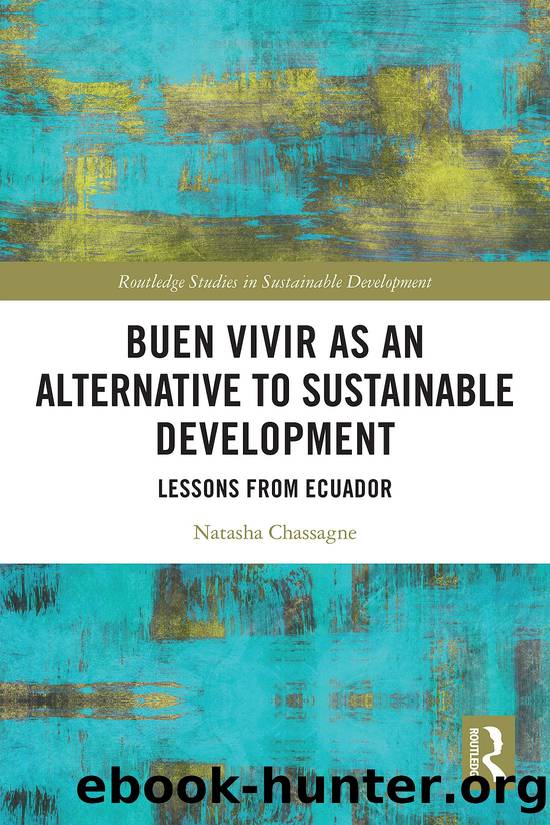Buen Vivir As an Alternative to Sustainable Development by Chassagne Natasha;

Author:Chassagne, Natasha;
Language: eng
Format: epub
Publisher: Taylor & Francis Group
Published: 2020-09-29T00:00:00+00:00
The role of organisations
Civil society and the social organisation of communities is doubly vital for helping communities satisfy their fundamental needs, through associations and local organisations. It is also necessary for effective and democratic participation, as JoaquÃn explains:
Where there is a diverse, pluralistic social fabric it is an important step in the governance of Cotacachi, the municipality of Cotacachi. If we build the concept of the organisation of urban, rural women rights, of children and youth to urban and rural areas, the organisation of farmers, the tourism sector, the artisanal sector, urban neighbourhoods; we contribute to that space for citizen participation that could only be much more effective in their demands and actions. [But] building the social fabric can be done when there is political will and when there is a vision of what you want to do. Because if it is to manipulate a group and give them food only, that is much easier. But thatâs populism, thatâs patronage.
Social organisation helps achieve change for the community, by the community. Laura uses the example of Cotacachi becoming Ecuadorâs first ecological county by decree, achieved through the will of the people: âOrganisation played an important role. As with all organisations of Cotacachi â some more, some less â but they finally gathered together and proposed to the mayor saying, âwell, we want this, and we are all going to conceive that Cotacachi become an ecological canton.ââ
The need for cooperation in the form of help also from external organisations was unanimously stated from all key informants, who see the value in working plurally with organisations to meet needs and achieve Buen Vivir. Diego states that this may be in the form of âsupport from the other institutions of advanced management to meet the needs that perhaps the same structure or policies of the parish [local government] cannot cover. At least the most unmet needs in the communities.â
Cooperation, though, does not allude merely to financial aid with no consideration of the actual needs of the community. âSatellite cooperationâ is not beneficial, as JoaquÃn argues, because it âmeans only leaving machines; (for instance) it does not contribute to capacity, the training of people in production, and so suddenly it does not meet its target. But if there is a much closer coordination, it is better taken advantage of.â Gabriela similarly states that outside support is good, however: âIt also pushes us to start working on, reflecting on what we want [as a community]. So, cooperation needs to work on the real needs of the community.â
Fernando argues that the needs of the community and the sustainability of projects has not been a priority in the past with international cooperation. He says:
If it was sustainable or not often did not matter. And I think that cooperation must today cooperate in things that are sustainable in the long term. It must be a common goal of society. It has to be that they help to sow the seeds that people want. So, we believe that cooperation is
Download
This site does not store any files on its server. We only index and link to content provided by other sites. Please contact the content providers to delete copyright contents if any and email us, we'll remove relevant links or contents immediately.
International Integration of the Brazilian Economy by Elias C. Grivoyannis(74416)
The Radium Girls by Kate Moore(11616)
Turbulence by E. J. Noyes(7694)
Nudge - Improving Decisions about Health, Wealth, and Happiness by Thaler Sunstein(7238)
The Black Swan by Nassim Nicholas Taleb(6760)
Rich Dad Poor Dad by Robert T. Kiyosaki(6173)
Pioneering Portfolio Management by David F. Swensen(6073)
Man-made Catastrophes and Risk Information Concealment by Dmitry Chernov & Didier Sornette(5643)
Zero to One by Peter Thiel(5487)
Secrecy World by Jake Bernstein(4387)
Millionaire: The Philanderer, Gambler, and Duelist Who Invented Modern Finance by Janet Gleeson(4089)
The Age of Surveillance Capitalism by Shoshana Zuboff(3980)
Skin in the Game by Nassim Nicholas Taleb(3965)
The Money Culture by Michael Lewis(3842)
Bullshit Jobs by David Graeber(3826)
Skin in the Game: Hidden Asymmetries in Daily Life by Nassim Nicholas Taleb(3720)
The Dhandho Investor by Mohnish Pabrai(3560)
The Wisdom of Finance by Mihir Desai(3523)
Blockchain Basics by Daniel Drescher(3326)
